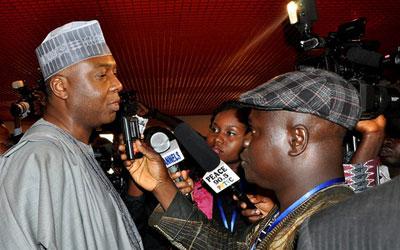On World Press Freedom Day last week, Nigeria’s Information Minister, Labaran Maku, publicly asserted that the country’s media “is one of the freest in the universe.” On paper, Nigeria’s 1999 Constitution guarantees the freedom of the press to “uphold…the responsibility and accountability of the government to the people.” But seven journalists who attempted to put this principle to practice on World Press Freedom Day experienced a different reality — one all too common for independent journalists working in Africa’s most populated nation.
On May 3, seven journalists turned up at the police Special Fraud Unit in Lagos, Nigeria’s commercial capital, to interview the former state governor and current parliamentarian, Bukola Saraki, whom police had summoned to respond to allegations of involvement in a multimillion dollar fraud, according to local media reports. Police officials directed the journalists to the office of the police spokesperson, Ngozi Isitume, in an adjacent building.
But as the politician emerged, preparing to leave, the personal assistant to SFU Commissioner of Police Tunde Ogunsakin rushed to the office door and locked the journalists inside together with Isitume, several of the journalists told me. They were held in the small office for 15 minutes, until Saraki and his entourage departed, they said.
“I was about to go out when he pushed me on the chest and said, ‘Go back, you can’t go out,'” said Oluwole Adeboye, a reporter with The News magazine and PM News. Ogunsakin’s aide, who later let the journalists out, said he acted on orders to save his job, according to news reports. The journalists promptly expressed their displeasure to Ogunsakin, who only asked his assistant to apologize to the journalists.
The journalists maintain that the police had planned to obstruct them all along. Their suspicions arose when, from the window of Isitume’s office, they saw Ogunsakin’s and Saraki’s aides talking and pointing to where the journalists were waiting. The police conspired to deny the journalists and their media houses their rights under the Nigeria Constitution and the Universal Declaration of Human Rights, they said. One of them, Patience Ogbo with Daily Times Online, described the experience as “the highest form of abuse of a citizen’s right to freedom of expression and movement.”
The other five journalists involved are Emmanuel Oshodi of The News/PM News; Benjamin Ezeamalu of Premium Times Online; Eniola Akinkuotu of The Punch newspapers; Albert Akpor of Vanguard Newspapers; and Wisdom Patrick of Daily Independent.
The government has not condemned the act nor taken any disciplinary measures against the officers of the Special Fraud Unit. This indifferent attitude of Nigerian authorities has emboldened the police to deny such an incident took place. When reached by phone, Ogunsakin categorically told me the journalists were never locked in. Isitume confirmed she and the journalists were together in her office during the period, but also denied they were locked in.
It is for times like this that World Press Freedom Day was founded — to remind us of the danger of allowing press freedom be violated: that it sets a dangerous precedent for future acts of impunity against journalists, human rights activists, and every citizen of any country. When the merits of such a day aren’t respected, society can only be worse for it.
(Reporting from Abuja, Nigeria)
